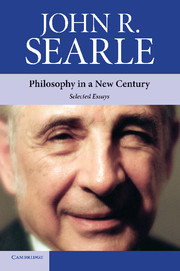Book contents
- Frontmatter
- Contents
- Original place of publication of the essays
- Introduction
- 1 Philosophy in a new century
- 2 Social ontology: some basic principles (with a new addendum by the author)
- 3 The Turing Test: fifty-five years later
- 4 Twenty-one years in the Chinese Room
- 5 Is the brain a digital computer?
- 6 The phenomenological illusion
- 7 The self as a problem in philosophy and neurobiology
- 8 Why I am not a property dualist
- 9 Fact and value, “is” and “ought,” and reasons for action
- 10 The unity of the proposition
- Name index
- Subject index
- References
5 - Is the brain a digital computer?
Published online by Cambridge University Press: 05 June 2012
- Frontmatter
- Contents
- Original place of publication of the essays
- Introduction
- 1 Philosophy in a new century
- 2 Social ontology: some basic principles (with a new addendum by the author)
- 3 The Turing Test: fifty-five years later
- 4 Twenty-one years in the Chinese Room
- 5 Is the brain a digital computer?
- 6 The phenomenological illusion
- 7 The self as a problem in philosophy and neurobiology
- 8 Why I am not a property dualist
- 9 Fact and value, “is” and “ought,” and reasons for action
- 10 The unity of the proposition
- Name index
- Subject index
- References
Summary
Presidential Address delivered before the Sixty-fourth Annual Pacific Division Meeting of the American Philosophical Association in Los Angeles, California, March 30, 1990.
INTRODUCTION, STRONG AI, WEAK AI AND COGNITIVISM
There are different ways to present a Presidential Address to the APA; the one I have chosen is simply to report on work that I am doing right now, on work in progress. I am going to present some of my further explorations into the computational model of the mind.
The basic idea of the computer model of the mind is that the mind is the program and the brain the hardware of a computational system. A slogan one often sees is “the mind is to the brain as the program is to the hardware.”
Let us begin our investigation of this claim by distinguishing three questions:
(1) Is the brain a digital computer?
(2) Is the mind a computer program?
(3) Can the operations of the brain be simulated on a digital computer?
I will be addressing 1 and not 2 or 3. I think 2 can be decisively answered in the negative. Since programs are defined purely formally or syntactically and since minds have an intrinsic mental content, it follows immediately that the program by itself cannot constitute the mind. The formal syntax of the program does not by itself guarantee the presence of mental contents. I showed this a decade ago in the Chinese Room Argument (Searle, 1980).
Information
- Type
- Chapter
- Information
- Philosophy in a New CenturySelected Essays, pp. 86 - 106Publisher: Cambridge University PressPrint publication year: 2008
References
Accessibility standard: Unknown
Why this information is here
This section outlines the accessibility features of this content - including support for screen readers, full keyboard navigation and high-contrast display options. This may not be relevant for you.Accessibility Information
- 2
- Cited by
